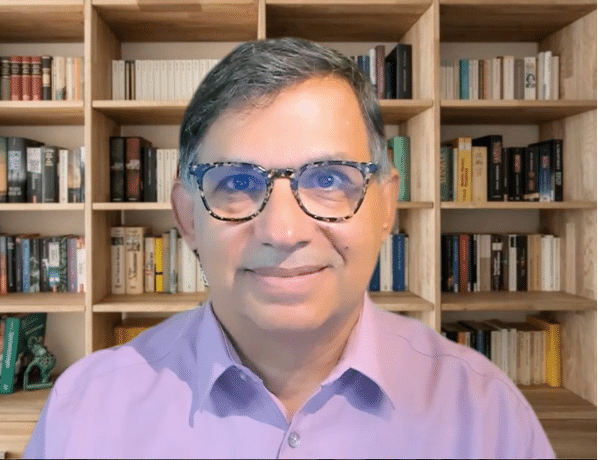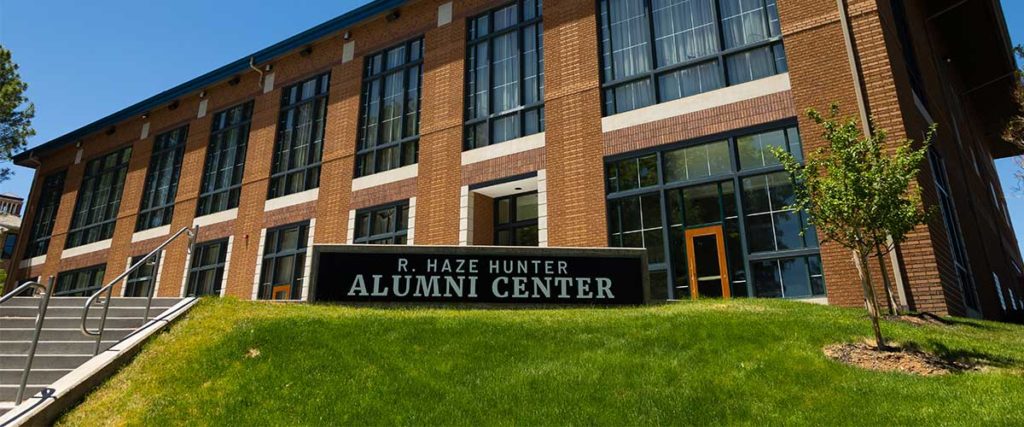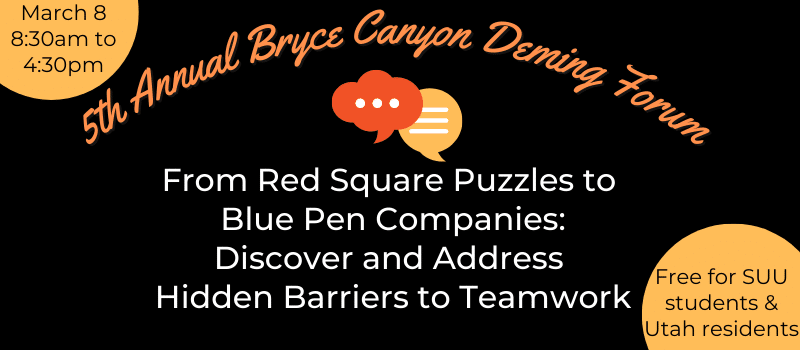From Red Square Puzzles to Blue Pen Companies – Discover and Address Hidden Barriers to Teamwork
Aim: For attendees to understand and begin applying Dr. Deming’s System of Profound Knowledge to lead and manage within their organizations.
This year’s Bryce Canyon Society Deming Forum focuses on the foundations of teamwork and the connecting power and potential this provides to all organizations. As Dr. Deming believed, working together is fundamental to both solving and preventing problems while providing the ability to continuously improve how they operate. Towards this end, individual and group proficiency in the principles and examples of “thinking together” is fundamental to organizations that “work together, learn together, and think together” and how they share and deploy resources. In the new economy, the systemic utilization of resources will be necessary, and fundamental to how all organizations operate.
This highly interactive learning event aims to reveal blind spots to teamwork and presents new fundamental concepts and strategies from the Deming philosophy. These strategies will shift organizations in a new direction, embedded with the vibrant benefits of a collaborative environment. This powerful new framework enables leaders to manage their resources better, including, but not limited to, time, money, knowledge, equipment, and people.
As designed, this seminar presents Dr. Deming’s System of Profound Knowledge both implicitly and explicitly, with the significance of each element of the four elements (systems, variation, knowledge, and psychology), plus their interactions, revealed through a series of “Organization Simulations.”
Presented by: Dr. Bill Bellows Advisory Council Member of The Deming Institute®, President, InThinking Services
Facilitators

Bill Bellows is 35+ year specialist in the fields of Quality and Engineering Management. In addition to his role as Adjunct Professor for California State University, Northridge and Southern Utah University, he serves as President of InThinking Services, partnering with clients to facilitate both the understanding and application of the Deming Philosophy and integrating this philosophy within a greater framework of “better thinking about thinking,” a concept known as “InThinking.”
Bill’s career includes 26 years of employment with Rocketdyne, the world’s premier liquid rocket engine company, providing leadership for “InThinking.” In addition to extensive application experience in the continual improvement of Rocketdyne’s products, processes, and services, these efforts included the design of a highly integrated curriculum of 200+ hours of learning events, known as “An InThinking Roadmap.”
Upon retiring Rocketdyne in 2016, Bill joined the The W. Edwards Deming Institute® for 2.5-years as Deputy Director to share his lessons learned within a worldwide Deming community. Today, as a member of The Deming Institute’s Advisory Council, he continues to tirelessly coach, mentor, facilitate, and advocate for the Institute’s aim.
Audiences for Bill’s presentations and seminars include after-school programs in elementary schools, graduate students at Northwestern University, as well as corporate, university, and public classes across the United Kingdom. Bill earned his BS, MS, and Ph.D. in Mechanical Engineering from Rensselaer Polytechnic Institute in Troy, New York. In addition to his employment by Rocketdyne, Bill worked as a heat transfer engineer in the gas turbine industry for Textron Lycoming in Stratford, Connecticut. In this role, he gained experience as an in-house problem-solving consultant, facilitator, and instructor, working in critical Engineering-Manufacturing Task Forces.
Away from work, Bill serves as a member of the Deming Medal Committee for the American Society of Quality. He was also the founding president of the In2:InThinking Network, a position he held from 2001 through 2016. He lives in Santa Clarita, California with wife, Monica.
Bill’s presentation at The W. Edwards Deming Institute’s 2017 Bryce Canyon Society Conference
Learning Objectives

Participants of this seminar will take their “next steps” in:
1. Understanding the leadership skills for managing interdependent actions, as defined by an evolving understanding of W. Edwards Deming’s System of Profound Knowledge
2. Learning how to discover opportunities for moving from the “Old Economics” of managing actions (parts, tasks, and milestones) to the “New Economics” of managing interactions
3. Discovering how traditional management systems are designed to manage an endless list of symptoms, resulting from not knowing how to lead with a “systems view”
4. Gaining an appreciation of two fundamental modes of thinking which operate in our blind spots, an awareness of which allows for shifting from a focus on “siloes” and “big problems” to “synergy” and “great opportunities” (for investment)
5. Recognizing the competitive advantage of understanding the differences between Compliance Excellence (a focus on Actions, in isolation) and Contextual Excellence (a focus on Actions, viewed as a system, also known as Interactions)
Location
 Gilbert Great Hall in the Hunter Alumni Center at Southern Utah University in Cedar City, Utah (See https://www.suu.edu/guestservices/hcc.html for directions)
Gilbert Great Hall in the Hunter Alumni Center at Southern Utah University in Cedar City, Utah (See https://www.suu.edu/guestservices/hcc.html for directions)
Event Details
Wednesday, March 8, 8:30am to 4:30pm
Gilbert Great Hall in the Hunter Alumni Center at Southern Utah University
Free for Utah residents & SUU students / $300 for non-residents
Staff at all levels of organizations, small and large, including industry, government, education, healthcare, and non-profits. We encourage SUU students to attend.
Full day of interactive exercises
Morning pastries, boxed lunch, coffee, tea, and sodas.





